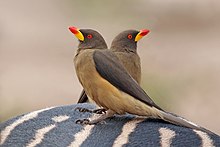Oxpeckers
| Oxpeckers | |
|---|---|
 |
|
|
Yellow-billed oxpeckers Buphagus africanus africanus on a zebra in Senegal |
|
| Scientific classification | |
| Kingdom: | Animalia |
| Phylum: | Chordata |
| Class: | Aves |
| Order: | Passeriformes |
| Suborder: | Passeri |
| Family: |
Buphagidae Lesson, 1828 |
| Genus: |
Buphagus Brisson, 1760 |
| Species | |
Buphagus africanus
Buphagus erythrorhynchus
The oxpeckers are two species of bird which make up the family Buphagidae. Some ornithologists regard them as a subfamily Buphaginae within the starling family, Sturnidae, but they appear to be quite distinct. Oxpeckers are endemic to the savanna of Sub-Saharan Africa. Both the English and scientific names arise from their habit of perching on large mammals (both wild and domesticated) such as cattle, zebras, impalas, hippopotamuses, or rhinoceroses, and eating ticks, small insects, botfly larvae, and other parasites.
According to the more recent studies of Muscicapoidea phylogeny, the oxpeckers are an ancient line related to Mimidae (mockingbirds and thrashers) and starlings but not particularly close to either. Considering the known biogeography of these groups, the most plausible explanation seems that the oxpecker lineage originated in Eastern or Southeastern Asia like the other two. This would make the two species of Buphagus something like living fossils, and demonstrates that such remnants of past evolution can possess striking and unique autapomorphic adaptations.
...
Wikipedia
